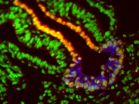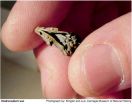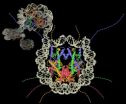(Press-News.org) BIRMINGHAM, Ala. – In the first head-to-head comparison of the three most common drugs used at the time of a kidney transplant to prevent organ rejection, researchers found that the least expensive drug – at one-half to one-fifth the price – is as safe and effective as the other two, according to a paper published by University of Alabama at Birmingham researchers in the May 19, 2011, issue of the New England Journal of Medicine.
Based at UAB, researchers in the INTAC trial spent three years following 474 patients who had undergone kidney transplants at 30 U.S. transplant centers. They compared the drugs basiliximab, antithymocyte globulin and alemtuzumab to definitively answer which of the three would be the most appropriate to prescribe to prevent rejection during the first six to 12 months following transplant surgery, when rejection is most likely.
"These are intravenous drugs given at the time of transplant in the operating room or early in the first week after transplant and are intensive immunosuppressants, designed to prevent early rejection," said the study's lead author, Michael Hanaway, M.D., surgeon in the Division of Abdominal Transplantation at UAB. With more than 260 transplants annually, the UAB kidney transplant program is among the busiest in the country.
The researchers found that alemtuzumab – a drug originally approved for lymphoma treatment, which costs around $2,000 – worked better than or as well as either basiliximab or antithymocyte globulin, which cost about $4,000 and $10,000, respectively.
"Alemtuzumab has been around for nearly 10 years but has only been studied in single-center settings with mixed results. Its safety and efficacy have never been totally clear. We have now answered a very important question for the transplant community," Hanaway said.
The use of these intensive immunosuppressants is known as induction therapy. In this process, transplant recipients are given antibody preparations to jump start the process of immunosuppression and reduce the risk of organ rejection. Patients receive these drugs in coordination with other standard post-transplant medications.
The researchers spent three years following 474 patients who had undergone kidney transplants at 30 U.S. transplant centers. Patients enrolled in the trial were first classified as being at a low or high risk of transplant rejection – high-risk patients included more African-Americans and patients already sensitized to transplantation from a previous transplant. Low-risk patients were randomly assigned to receive either basiliximab or alemtuzumab. High-risk patients were randomized into receiving antithymocyte globulin or alemtuzumab. Researchers then compared the efficacy and safety of basiliximab and antithymocyte globulin with that of alemtuzumab.
"We found there was less rejection in the low-risk patients when using alemtuzumab and about the same amount of rejection in high-risk patients," Hanaway said. "What makes alemtuzumab different is the cost. Now that we know there is not any more rejection or infections with alemtuzumab, it makes sense to go with the one that is cheaper and just as effective."
Hanaway added that while there are limitations to the study and future studies are needed to address these limitations, UAB transplant surgeons began using alemtuzumab three years ago based on early results from this study.
"No medication is perfect, but we believe this is as safe and effective in patients," Hanaway said.
INFORMATION:
The study was funded by Astellas Pharma Global Development group, a company that manufactures an oral immunosupressant drug not used in this study. Co-authors on the paper are E. Steve Woodle, M.D., University of Cincinnati College Of Medicine; Shamkant Mulgaonkar, M.D., Saint Barnabas Health Care System in West Orange, NJ; V. Ram Peddi, M.D., California Pacific Medical Center in San Francisco; Dixon B. Kaufman, M.D., University of Wisconsin School of Medicine; and M. Roy First, M.D., Richard Croy, Ph.D., and John Holman, M.D., Astellas Pharma.
About UAB
Known for its innovative and interdisciplinary approach to education at both the graduate and undergraduate levels, the University of Alabama at Birmingham is the state of Alabama's largest employer and an internationally renowned research university and academic health center; its professional schools and specialty patient-care programs are consistently ranked among the nation's top 50. Find more information at www.uab.edu and www.uabmedicine.org.
EDITOR'S NOTE: The University of Alabama at Birmingham (UAB) is a separate, independent institution from the University of Alabama, which is located in Tuscaloosa. Please use University of Alabama at Birmingham on first reference and UAB on all consecutive references.
END
Alexandria, Va. – The American Society of Clinical Oncology (ASCO) today highlighted several studies in a press briefing from among more than 4,000 abstracts publicly posted online at www.asco.org in advance of ASCO's 47th Annual Meeting. An additional 17 plenary, late-breaking and other major studies will be released in on-site press conferences at the Annual Meeting.
The meeting, which is expected to draw approximately 30,000 cancer specialists, will be held June 3-7, 2011, at McCormick Place in Chicago, Ill. The theme of this year's meeting is "Patients. Pathways. ...
Philadelphia, PA, May 18, 2011 – Abnormal uterine bleeding (AUB) in women of reproductive age may be due to a wide range of disorders or pathologies. Until now, there has been no universally accepted method for classifying such patients, which has impeded basic science and clinical investigation, as well as the practical, rational, and consistent application of medical and surgical therapy. As the result of a stringent 5-year review process, a multinational group of clinician–investigators with broad experience in the investigation of AUB has now agreed on a classification ...
A human genetic variant associated with an almost 30 percent reduced risk of developing severe malaria has been identified. Scientists from the Bernhard Nocht Institute for Tropical Medicine (BNITM), Hamburg, and Kumasi University, Ghana, reveal that a variant at the FAS locus can prevent an excessive and potentially hazardous immune response in infected children. The study appears in the open-access journal PLoS Genetics on May 19.
Severe malaria is a major public health burden in Sub-Saharan Africa, where approximately one million individuals die each year as a result ...
A rose by any other name would smell as sweet; the saying is perhaps a testament to the acute sense of smell that is unique to mammals. Paleontologists have now discovered that an improved sense of smell jumpstarted brain evolution in the ancestral cousins of present-day mammals. The research will appear in the 20 May 2011 issue of the journal Science, which is published by AAAS, the international, nonprofit science society.
The findings may help explain why mammals evolved such large and complex brains, which in some cases ballooned 10 times larger than relative body ...
Mammals first evolved their characteristic large brains to enable a stronger sense of smell, according to a new study published this week in the journal Science by paleontologists from The University of Texas at Austin, Carnegie Museum of Natural History and St. Mary's University in San Antonio.
This latest study is the first to use CT technology, similar to medical scanners, to reconstruct the brains of two of the earliest known mammal species, both from the Jurassic fossil beds of China. The 3D scans revealed that even these tiny, 190-million-year-old animals had developed ...
PHILADELPHIA – Discovering the step-by-step details of the path embryonic cells take to develop into their final tissue type is the clinical goal of many stem cell biologists.
To that end, Kenneth S. Zaret, PhD, professor of Cell and Developmental Biology at the Perelman School of Medicine at the University of Pennsylvania, and associate director of the Penn Institute for Regenerative Medicine, and Cheng-Ran Xu, PhD, a postdoctoral researcher in the Zaret laboratory, looked at immature cells called progenitors and found a way to potentially predict their fate. They base ...
Pittsburgh, Pennsylvania… Paleontologists have often wondered why mammals—including humans—evolved to have larger brains than other animals. A team of paleontologists now believe that large brains may have developed in mammals to facilitate an acute sense of smell, according to a new paper published today in the prestigious journal Science. The team also noticed enlargement in the areas of the brain that correspond to the ability to sense touch through fur; this sense is acutely developed in mammals.
Scientists used high-resolution CT scans to study rare 190-million-year-old ...
After the death of Osama bin Laden, New York personal injury lawyer David Perecman reaffirmed his commitment to help the heroes who are still battling illnesses connected to 9/11.
For many individuals, the death of bin Laden brought closure. The death also served to rekindle memories of those who volunteered to assist at the World Trade Center site after the 9/11 attacks.
The lives of many Ground Zero volunteers were changed in challenging ways. Rescue and recovery workers and others are still suffering from health consequences related to the World Trade Center disaster.
"People ...
SEATTLE – Researchers at Fred Hutchinson Cancer Research Center have discovered a new drug target for squamous cell carcinoma – the second most common form of skin cancer. Scientists in the laboratory of Valeri Vasioukhin, Ph.D., have found that a protein called alpha-catenin acts as a tumor suppressor and they also have unlocked the mechanism by which this protein controls cell proliferation.
The findings by Vasioukhin and colleagues will be published May 24 in Science Signaling.
For the study, the researchers studied mice that were bred to lack a copy of the gene that ...
Scientists at Penn State University have achieved a major milestone in the attempt to assemble, in a test tube, entire chromosomes from their component parts. The achievement reveals the process a cell uses to package the basic building blocks of an organism's entire genetic code -- its genome. The evidence provided by early research with the new procedure overturns three previous theories of the genome-packaging process and opens the door to a new era of genome-wide biochemistry research. A paper describing the team's achievement will be published in the journal Science ...


